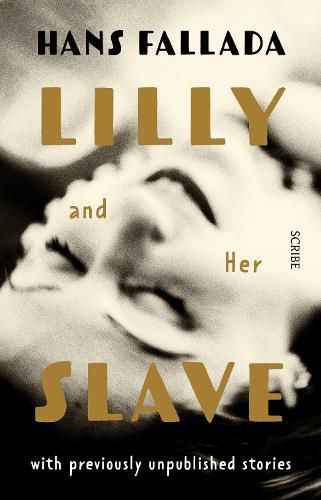Readings Newsletter
Become a Readings Member to make your shopping experience even easier.
Sign in or sign up for free!
You’re not far away from qualifying for FREE standard shipping within Australia
You’ve qualified for FREE standard shipping within Australia
The cart is loading…






It was the turning point before he became a bestselling author: Hans Fallada handed himself in to the police in September 1925, following repeated cases of embezzlement to finance his alcohol and morphine addiction.
At the time, a court-appointed doctor was assigned to assess the extent to which Fallada could be made accountable. This expert opinion, thought to have been lost, was only recently rediscovered. It is an extraordinary find, because it includes unpublished and rewritten stories by Fallada that reveal his early, unparalleled insight into the female psyche, and that focus on hitherto taboo topics such as rape and abortion.
The title character, Lilly, is a young, untamed, headstrong girl. She sets out to ‘play’ with a young man, but ends up losing control of the situation. Barely able to hide her questionable actions, she ends up in a sanatorium, where she engages in a bizarre duel of reciprocal manipulation with another patient. In the end, it is impossible to tell who is victorious.
Marie and Thilde, the protagonists of two other stories, are strong women who rebel against the pre-established patterns imposed on them by society, while two male outsiders, Pogg and Robinson, seek refuge and hope in a prison cell.
$9.00 standard shipping within Australia
FREE standard shipping within Australia for orders over $100.00
Express & International shipping calculated at checkout
It was the turning point before he became a bestselling author: Hans Fallada handed himself in to the police in September 1925, following repeated cases of embezzlement to finance his alcohol and morphine addiction.
At the time, a court-appointed doctor was assigned to assess the extent to which Fallada could be made accountable. This expert opinion, thought to have been lost, was only recently rediscovered. It is an extraordinary find, because it includes unpublished and rewritten stories by Fallada that reveal his early, unparalleled insight into the female psyche, and that focus on hitherto taboo topics such as rape and abortion.
The title character, Lilly, is a young, untamed, headstrong girl. She sets out to ‘play’ with a young man, but ends up losing control of the situation. Barely able to hide her questionable actions, she ends up in a sanatorium, where she engages in a bizarre duel of reciprocal manipulation with another patient. In the end, it is impossible to tell who is victorious.
Marie and Thilde, the protagonists of two other stories, are strong women who rebel against the pre-established patterns imposed on them by society, while two male outsiders, Pogg and Robinson, seek refuge and hope in a prison cell.
‘Hans Fallada’ is the nom de plume of Rudolf Ditzen (1893–1947), a German writer who chronicled desperate lives between the wars. His best-known novel, Alone in Berlin, published weeks after his death, fictionalises the real-life story of an older couple who distributed anti-Nazi postcards around Berlin until they were arrested, tortured and executed.
Ditzen’s morphine addiction, alcoholism and stints in prisons and psychiatric hospitals were contributing factors to much of his prior work being lost or neglected, but the 21st century has seen a rediscovery and translation of his back catalogue. In 1925 Ditzen turned himself over to the police for stealing from his employers in order to finance his morphine and alcohol requirements. This collection of shorter and longer pieces, published only now as Lilly and Her Slave, was submitted to the court doctor in order to assess how accountable he was for his actions. If I’d been that doctor, I reckon I would have informed the court that the man in the dock before them was a haunted, troubled writer with a talent for observations from the gutter, and a tendency to cast women in the femme fatale role.
The pieces range from satire – ‘Pogg, the Coward’ stars a man bloated with self-importance – to the pointedly titled polemic ‘Who Can Be the Judge?’, but mostly these stories are investigations of fallible, broken people and their doomed relationships. Ditzen/Fallada is fascinated by the ambivalence and the loathing that can drive love. In the most effective and affecting tale in the collection, ‘The Machinery of Love’, he paints the troubling portrait of a woman whose childhood trauma plays out in perverse ways through her marriage and affairs. ‘Which life is without lies?’ she asks at the beginning of the tale, the question at the core of all these stories.
See what the Readings’ team have to say on the blog, discover related events and podcast episodes.